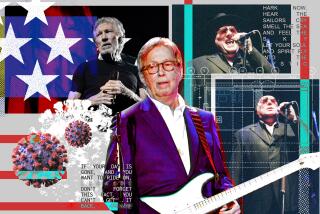Yes, they’re the great pretenders
- Share via
HOW CAN THIS happen in America? If I plunk down my hard-earned entertainment dollars to see a group called the Coasters, it’s got to at least have something to do with the Coasters, right? Somebody has to have had some connection to “Yakety Yak,” “Charlie Brown,” “Poison Ivy” and the other classic hits that made the Coasters the first group to be inducted into the Rock ‘n’ Roll Hall of Fame, right?
Not necessarily. In fact, Carl Gardner, who sang virtually every Coasters lead and is the holder of the federally registered trademark of the name, has spent years trying to shut down shows by Coasters impostor groups. But even with the trademark as a weapon, his task has proved nearly impossible. He is more than entitled to quote Charlie Brown and ask, “Why’s everybody always pickin’ on me?”
Impostor groups are everywhere. In a sophisticated form of identity theft, they perform across the country at theaters, festivals and fairs. Often they perform on the same oldies bill as one another, duping consumers and stealing the remuneration and applause due the real pioneers of rock ‘n’ roll.
It hasn’t happened to me. But when I sang with Sha Na Na, which began paying homage to vintage rock ‘n’ roll in the late 1960s, I met most of my childhood idols, the people who sang those songs. I’m honored to call them my friends. And I’m distressed to see so many of them suffer while impostors take their livelihood and, what’s worse, their glory.
It’s done cleverly. There’s usually at least one really old guy in the phony group, so that you can sit out in the audience and say: “That must be the ‘real one.’ ” A young lady recently told me that she was taken by her parents to see what she thought was her favorite group, “The World Famous Platters,” for her Sweet 16 party. She reports that “Rooster,” the lead singer, told her he sang lead on all the Platters’ hits and then “proceeded to deface my Platters’ albums with his autograph.” You see, she’d noticed that there was no “Rooster” listed on any of her albums.
A group claiming to be the Shangri-Las (“Leader of the Pack”) has actually gained legal rights to the group name in a court settlement, but even under existing law that still doesn’t entitle them to the group’s history. I once saw two “Shangri-Las” barely out of diapers hold up the hand of the “real one” and say: “And this is Mom,” implying that she was both a member of the original group (which she wasn’t) and their mom (which she also wasn’t).
I have been told by several musicians who back up these impostor shows that they’ve seen instances when one of the phony groups didn’t make it to the gig. So some of the fake “Coasters” who’d just performed changed out of the red spangly suits into the blue spangly suits and reemerged as the “Drifters”! You got a problem with that?
And the people behind all this know how to work the system. If they are sued, they just keep making motions to run up the fees in an effort to bankrupt the real artists, who in many cases have been ripped off all their lives. And, yes, there is an underlying issue of race here. The vast majority of the groups that are being knocked off are African American.
The impostor problem can affect all generations of musicians, but I suspect it’s at its worst with the early pioneers, who were just too faceless. It will be harder to imitate groups from the music video era. But I’m sure someone will try.
That’s why I’ve been working with the Vocal Group Hall of Fame on a bill to solve this problem in perpetuity. Legislation has passed in Pennsylvania and is being considered in 12 other states; we’re introducing it in California soon. It requires that an authentic member of the “recording group” appear in the “performing group,” unless the performing group owns a legitimate federally registered trademark to the name.
If you want a gut-wrenching experience, try watching a baby boomer audience leap to its feet at the end of an impostor group show. The audience so clearly thinks it’s honoring the body of work, the legacy, the deep pleasure this music has given them since their youth, the way this music brought people of different races together in America and helped change the world.
They don’t know they’re applauding the wrong people! Come to think of it, you may have been in one of those audiences and been duped yourself. How can this happen in America?
More to Read
Sign up for The Wild
We’ll help you find the best places to hike, bike and run, as well as the perfect silent spots for meditation and yoga.
You may occasionally receive promotional content from the Los Angeles Times.






